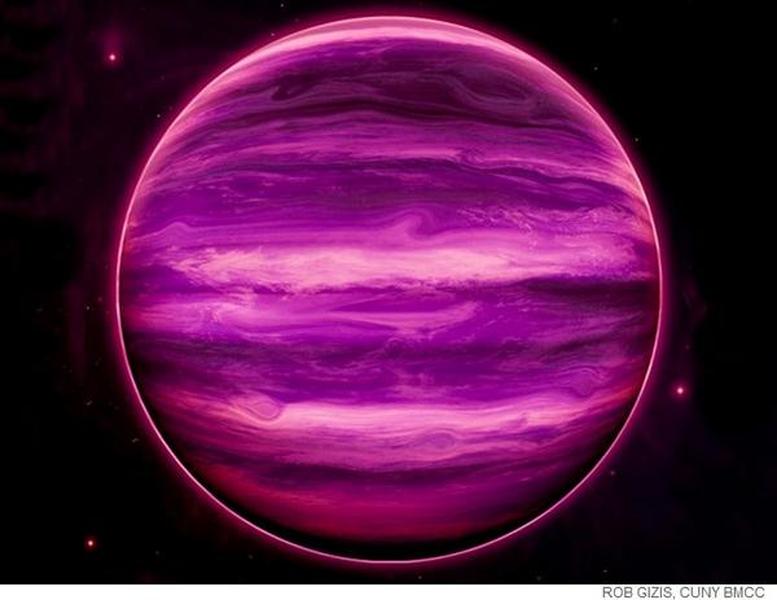Scientists reportedly discover the first water clouds beyond our solar system


A free daily email with the biggest news stories of the day – and the best features from TheWeek.com
You are now subscribed
Your newsletter sign-up was successful
Astronomers have reportedly discovered signs of water clouds 7.3 light-years away from Earth.
The water clouds would be the first to be found beyond our solar system, if the discovery is confirmed. The findings will be published in The Astrophysical Journal Letters.
Kevin Luhman, an astronomer at Pennsylvania State University, University Park, found the clouds with images taken from 2010 to 2011 by NASA's WISE infrared telescope. The clouds surround a brown dwarf — a.k.a. a "failed star" that has faded and cooled — named WISE J0855-0714. WISE J0855-0714 is the coldest brown dwarf known to scientists, with a temperature lower than water's freezing point.
The Week
Escape your echo chamber. Get the facts behind the news, plus analysis from multiple perspectives.

Sign up for The Week's Free Newsletters
From our morning news briefing to a weekly Good News Newsletter, get the best of The Week delivered directly to your inbox.
From our morning news briefing to a weekly Good News Newsletter, get the best of The Week delivered directly to your inbox.
"I've been obsessed with this object since its discovery," Jacqueline Faherty, an astronomer at the Carnegie Institution for Science in Washington, D.C., told Science magazine. "I'm absolutely elated." Faherty used Chile's Magellan Baade telescope to capture images that matched previous models of a brown dwarf with water clouds.
The evidence is still tentative, but scientists are fascinated with the discovery's implications. If water clouds are confirmed outside our solar system, the findings could provide astronomers with new information about space's atmospheres. Science reports that the brown dwarf will likely be explored further by NASA's James Webb Space Telescope, which is in the assembly and test process. --Meghan DeMaria
A free daily email with the biggest news stories of the day – and the best features from TheWeek.com
Meghan DeMaria is a staff writer at TheWeek.com. She has previously worked for USA Today and Marie Claire.
-
 Why is the Trump administration talking about ‘Western civilization’?
Why is the Trump administration talking about ‘Western civilization’?Talking Points Rubio says Europe, US bonded by religion and ancestry
-
 Quentin Deranque: a student’s death energizes the French far right
Quentin Deranque: a student’s death energizes the French far rightIN THE SPOTLIGHT Reactions to the violent killing of an ultraconservative activist offer a glimpse at the culture wars roiling France ahead of next year’s elections
-
 Secured vs. unsecured loans: how do they differ and which is better?
Secured vs. unsecured loans: how do they differ and which is better?the explainer They are distinguished by the level of risk and the inclusion of collateral
-
 Blue Origin launches Mars probes in NASA debut
Blue Origin launches Mars probes in NASA debutSpeed Read The New Glenn rocket is carrying small twin spacecraft toward Mars as part of NASA’s Escapade mission
-
 Dinosaurs were thriving before asteroid, study finds
Dinosaurs were thriving before asteroid, study findsSpeed Read The dinosaurs would not have gone extinct if not for the asteroid
-
 SpaceX breaks Starship losing streak in 10th test
SpaceX breaks Starship losing streak in 10th testspeed read The Starship rocket's test flight was largely successful, deploying eight dummy satellites during its hour in space
-
 Rabbits with 'horns' sighted across Colorado
Rabbits with 'horns' sighted across Coloradospeed read These creatures are infected with the 'mostly harmless' Shope papilloma virus
-
 Lithium shows promise in Alzheimer's study
Lithium shows promise in Alzheimer's studySpeed Read Potential new treatments could use small amounts of the common metal
-
 Scientists discover cause of massive sea star die-off
Scientists discover cause of massive sea star die-offSpeed Read A bacteria related to cholera has been found responsible for the deaths of more than 5 billion sea stars
-
 'Thriving' ecosystem found 30,000 feet undersea
'Thriving' ecosystem found 30,000 feet underseaSpeed Read Researchers discovered communities of creatures living in frigid, pitch-black waters under high pressure
-
 New York plans first nuclear plant in 36 years
New York plans first nuclear plant in 36 yearsSpeed Read The plant, to be constructed somewhere in upstate New York, will produce enough energy to power a million homes
